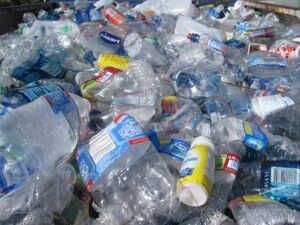New enzyme could eliminate billions of tonnes of plastic waste
Engineers and scientists at The University of Texas in Austin have developed an enzyme variant which can break down plastics within a few hours or days time.
It’s believed the enzyme could supercharge recycling on a large scale and would allow major industries to reduce their environmental impact by reusing plastics.
Plastic waste typically takes centuries to degrade and is a major problem, with billions of tonnes of it currently piling up in landfills and polluting land and waterways.
‘The possibilities are endless across industries to leverage this leading-edge recycling process,’ said Hal Alper, professor in the McKetta Department of Chemical Engineering at UT Austin. ‘Beyond the obvious waste management industry, this also provides corporations from every sector the opportunity to take a lead in recycling their products. Through these more sustainable enzyme approaches, we can begin to envision a true circular plastics economy.’
Research focused on polyethylene terephthalate (PET), a form of plastic which makes up 12% of all global waste and is found in most packaging, such as drinks bottles and salad packaging.
The enzyme could complete a ‘circular process’, breaking down the plastic into smaller parts and then chemically putting it back together in some cases in as little as 24 hours.

The study teamed up with scientists at the Cockrell School of Engineering and College of Natural Sciences where researchers proved the effectiveness of the enzyme they’ve named FAST-PETase.
Recycling has been the main method of cutting down plastic waste, but globally less than 10% of plastic has been recycled.
Other methods of getting rid of plastic include burning it, which is not only expensive but energy intensive, releasing toxic gas into the air.
However, this new biological method takes up much less energy and scientists have proven the enzyme can break down plastic at low temperatures, making it portable and affordable for industry.
Next the team will work on scaling up enzyme production in preparation of introducing it to industry, as they are in the process of deciding where best to apply the method.
Potential uses include cleaning up landfills and cleaning up polluted sites as part of environmental remediation.
‘When considering environmental clean up applications, you need an enzyme that can work in the environment at ambient temperature,’ added Mr Alper. ‘This requirement is where our tech has a huge advantage in the future.’
Photo by Tanvi Sharma















